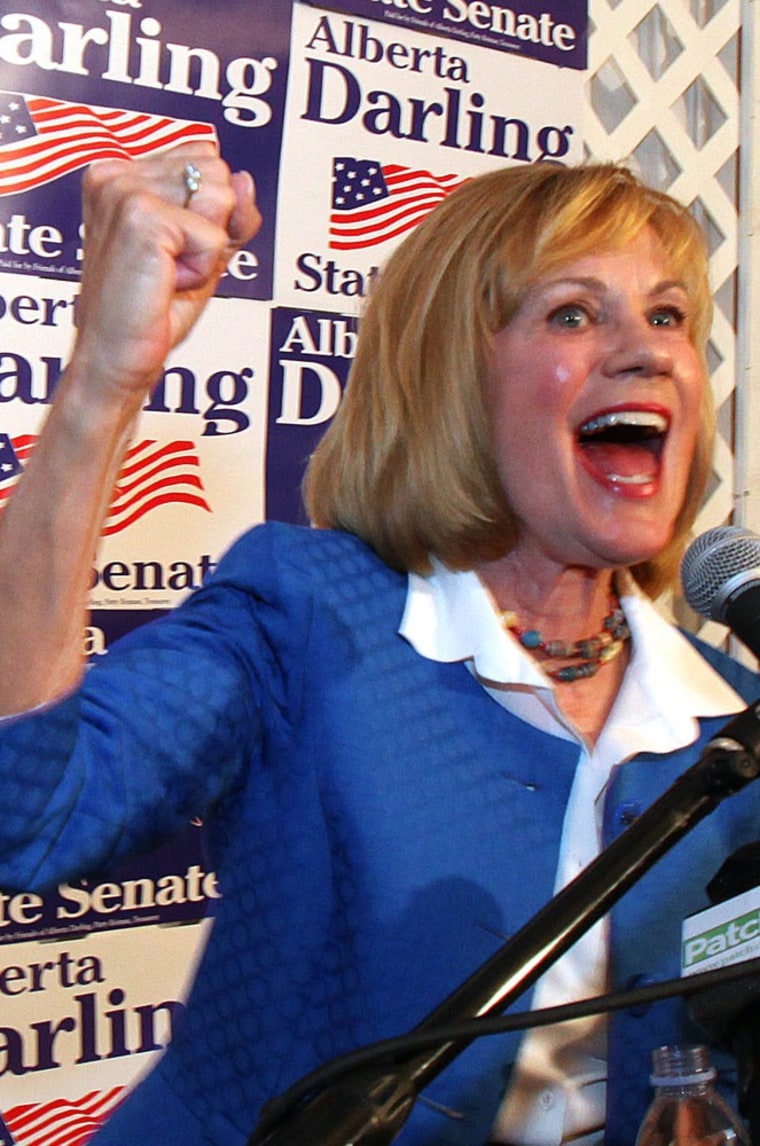Democrats failed late Tuesday in their effort to gain control of the Wisconsin state senate as Republican incumbents won four of six recall elections.
The outcome was a big setback for Democrats, organized labor, and progressive groups who'd sought retribution against six GOP allies of Gov. Scott Walker, who earlier this year enacted a labor law overhaul that ended collective bargaining rights for many public sector workers.
The recall elections attracted millions of dollars of investment from both liberals and conservatives across the nation.
Most at risk as voting started Tuesday appeared to be three Republicans, Alberta Darling, Randy Hopper and Dan Kapanke, all of whom had barely won their races in 2008.
Kapanke and Hopper lost, but Darling won with 54 percent with most of the precincts counted, partly due to her outperforming her 2008 majority in heavily Republican Waukesha County.
In 2008, Darling had won her district by a mere 1,007 out of more than 99,000 votes cast. Her district went narrowly for Barack Obama in 2008.
Three other Republican lawmakers also survived the Democratic recall effort: Sen. Robert Cowles, Sen. Sheila Harsdorf and Sen. Luther Olsen.
With the split in Wisconsin’s Senate at 19 Republicans and 14 Democrats as the day began, a turnover of three would have changed party control.
Next Tuesday there will be recall elections for two Democratic senators, one of whom barely won in 2008.
While there's a risk of extrapolating too much from the relatively small number of people who voted in Wisconsin Tuesday, the outcome may give an inkling about party motivation and organizing ability as strategists ponder the 2012 election in what could be a pivotal state.
Obama won the state in 2008 with 56 percent, but George W. Bush nearly won Wisconsin in 2004, falling short by only 11,000 votes out of nearly three million votes cast.
Obama's campaign manager Jim Messina has identified the state as one of the targets for 2012.
With the retirement of Democratic Sen. Herb Kohl, there's also an open U.S. Senate seat in Wisconsin next year.
The Cook Political Report rates that race as one of seven toss-ups in what are now Democratic-held Senate seats. Republicans need a net gain of four to win control of the U.S. Senate.
Big win for Walker?Republicans saw the race as a big win for Walker and a confirmation of his conservative agenda.
"Republicans are going to continue doing what we promised the people of Wisconsin — improve the economy and get Wisconsin moving back in the right direction," Republican Senate Majority Leader Scott Fitzgerald said in a prepared statement after the victory.
Walker attempted to strike a bipartisan tone in victory, saying that he reached out to leaders in both parties.
"In the days ahead, I look forward to working with legislators of all parties to grow jobs for Wisconsin and move our state forward," Walker said in a prepared statement.
Democrats and union leaders tried to make the best of the historic GOP wins. There had been only 13 other successful recalls of state-level office holders nationwide since 1913.
"The fact of the matter remains that, fighting on Republican turf, we have begun the work of stopping the Scott Walker agenda," said Democratic Party Chairman Mike Tate.
Phil Neuenfeldt, president of the Wisconsin State AFL-CIO, said voters sent a message that there is a growing movement to reclaim the middle class.
"Let's be clear, anyway you slice it, this is an unprecedented victory," he said.
Still, it was far less than what Democrats set out to achieve.
And while they still plan to move ahead with recalling Walker, maintaining momentum for that effort which can't start until November will be difficult.
